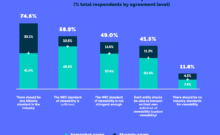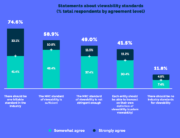Thousands of apps are masquerading as premium publishers in order to bypass new industry-wide protections against ad fraud, according to new data.
Researchers at fraud detection firm Forensiq recently uncovered a scam in which apps sell ad inventory under the guise of major media websites in a bid to fool the Interactive Advertising Bureau’s (IAB’s) Ads.txt authorization system, an anti-fraud measure designed to prevent this type of deception. Bad actors then take advantage of the higher prices these outlets command by loading rapid-fire ads and faking impressions.
First introduced last summer, Ads.txt is a standardized text file that publishers and programmatic platforms use to verify which companies are authorized to sell which publishers’ inventory. The increased transparency is supposed to reduce the scourge of domain spoofing—the passing off of fake or low-quality impressions as those of a pricier established brand—which is estimated to cost top publishers $1.3 billion per year.
The IAB has long known that Ads.txt has a blindspot when it comes to in-app advertising, and the trade group recently offered a few possible proposals to expand the system to the app world. But the solutions focus on preventing apps from spoofing so-called bundle IDs—the app equivalent of a domain name—rather than apps impersonating websites, according to Forensiq. The latter should ostensibly be preventable under the current Ads.txt framework.
Read More At The Original Article: www.adweek.com









